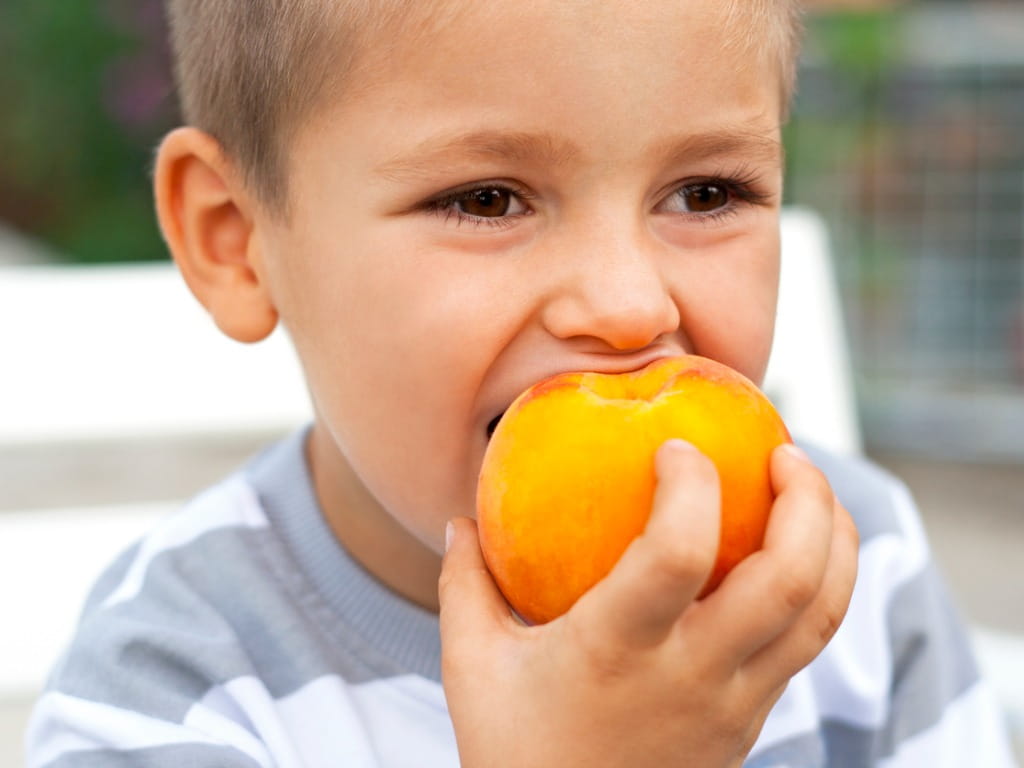Are Peach Pits Poisonous?

The Bottom Line
Peach pits and other seeds from the plant family Prunus contain a potentially dangerous chemical called amygdalin that can creates poisonous cyanide when digested. While swallowing a single pit is unlikely to cause cyanide poisoning, consumption of several unprocessed pits can produce symptoms.

What is in a peach pit?
Peach pits contain amygdalin—a substance that can create cyanide when digested by enzymes in the gut. The seeds of many types of fruit in the family Prunus, (e.g., peaches, apricots, cherries, and plums) contain amygdalin. Almonds are the seeds of a plant in this family as well but are safe to eat. Cyanide is a poisonous chemical that causes severe stomach upset, difficulty breathing, and low blood pressure. In severe cases of cyanide poisoning, organ failure and even death can occur.
How much cyanide is in a peach pit?
The amount of cyanide-producing amygdalin in peach pits varies. A single peach pit is not likely to contain enough of this chemical to cause serious harm to most people. However, some peach pits might contain enough amygdalin to be harmful to very small children.
Are peach pits poisonous?
Peach pits can be poisonous if too many are eaten or if they are prepared improperly. Some types of cuisine or traditional medicine recommend consuming peach pits or the pits of similar fruits like apricots. The pits must be prepared in a way that breaks down amygdalin to prevent people eating them from being poisoned. According to the Singapore Food Agency, the typical preparation for apricot pits is to soak the pits in water and then boil them for at least 30 minutes.
Amygdalin, also known as laetrile or vitamin B17, has been recommended by some as an alternative treatment for cancer. There is no evidence that this is a safe or effective treatment for cancer, and the chemical can be harmful by producing toxic levels of cyanide when it is broken down in the gut.
What should I do if someone eats a peach pit?
If someone consumes a peach pit or a seed of another stone fruit, get guidance from Poison Control immediately. Help from Poison Control is available online at www.poison.org and by phone at 1-800-222-1222. Both options are free, confidential, and available 24 hours a day.
Joshua Drobina, BSN, RN, CSPI
Registered Nurse & Certified Specialist in Poison Information
Poisoned?
Call 1-800-222-1222 or
Prevention Tips
- Remove the pits from peaches when cooking to avoid accidentally eating them.
- Remove and dispose of the pits before giving peaches or other stone fruit to children.
- Discuss the safety of alternative medicines with your healthcare team before beginning treatment.
This Really Happened
A woman accidentally added a single peach pit to a smoothie she prepared in her blender. Several people drank the smoothie. She called Poison Control and was advised that the amount of peach pit in the smoothie was unlikely to cause anyone harm. Poison Control contacted the woman the following day and found that none of the people involved developed any symptoms.For More Information
Laetrile/amygdalin (PDQ®)–patient version. Bethesda (MD): National Cancer Institute; 2022 Jun 2 [accessed 2022 Dec 10].References
Natural toxins in bitter apricot seeds. Hong Kong; revised 2017 Jul 6 [accessed 2022 Dec 12].
Poisoned?
Call 1-800-222-1222 or
Prevention Tips
- Remove the pits from peaches when cooking to avoid accidentally eating them.
- Remove and dispose of the pits before giving peaches or other stone fruit to children.
- Discuss the safety of alternative medicines with your healthcare team before beginning treatment.
